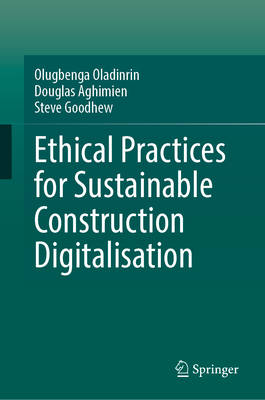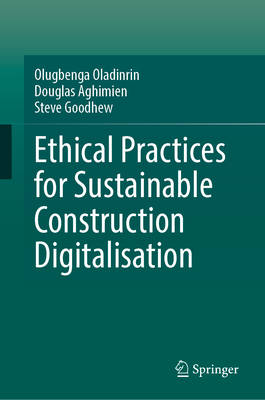
- Retrait gratuit dans votre magasin Club
- 7.000.000 titres dans notre catalogue
- Payer en toute sécurité
- Toujours un magasin près de chez vous
- Retrait gratuit dans votre magasin Club
- 7.000.0000 titres dans notre catalogue
- Payer en toute sécurité
- Toujours un magasin près de chez vous
Ethical Practices for Sustainable Construction Digitalisation
Olugbenga Oladinrin, Douglas Aghimien, Steve GoodhewDescription
This volume provides a framework for ethical and sustainable digitalization in the construction industry. The fourth industrial revolution has significantly changed how industries worldwide operate and deliver their products and services. This paradigm shift has brought with it ubiquitous emerging physical, biological and digital technologies that are disrupting activities in industries across the globe. The construction industry is not immune to the disruption of these technologies. From solving the issues of poor cost, time and quality that has bedevilled the industry for a long while to ensuring clients are satisfied and workers are safe, digital technologies have proven to be effective in improving how the construction industry function. For instance, the use of building information modelling has garnered considerable attention in addressing salient design and collaboration issues, among others, facing the industry. In the same vein, the internet of things, big data analytics, cloud computing, drones, robotics, sensors and a host of other technologies have been explored to improve the management and delivery of construction projects.
Regrettably, this concept of ethics has been downplayed in the quest for the digital transformation of construction industries worldwide. For the successful digitalisation of the construction industry, which relies heavily on human interaction with technology, the role of ethics cannot be overlooked. There is an absence of a roadmap for the ethical use of digital technologies in the digitalisation of the construction industry. This book, which is designed to give direction for the ethical use of digital tools in the construction industry, fills that gap.
Spécifications
Parties prenantes
- Auteur(s) :
- Editeur:
Contenu
- Nombre de pages :
- 155
- Langue:
- Anglais
Caractéristiques
- EAN:
- 9783032001504
- Date de parution :
- 22-10-25
- Format:
- Livre relié
- Format numérique:
- Genaaid
- Dimensions :
- 155 mm x 235 mm

Les avis
Nous publions uniquement les avis qui respectent les conditions requises. Consultez nos conditions pour les avis.






